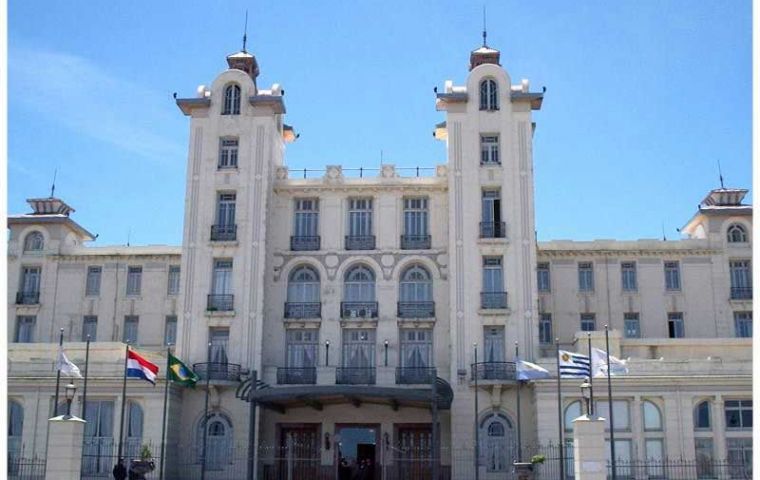MercoPress. South Atlantic News Agency
Mercosur feeling the crunch particularly in trade and credit access
 Mercosur headquaters in Montevideo
Mercosur headquaters in Montevideo Mercosur is already feeling the effects of the global crisis in its foreign sector and economic activity, according to a report from the prestigious Argentine consultants Ecolatina.
“Since the beginning of the fourth quarter of 2008 the currencies of the four countries (Argentina, Brazil, Paraguay and Uruguay) have devalued abruptly, risk ratings have soared and international reserves have dropped”, says Ecolatina, closely linked to Argentina’s former Economy minister Roberto Lavagna.
However, even when the crisis has triggered the fleeing of capital and limited credit access to the region, the report emphasizes that the main impact for Mercosur is filtering through “the trade channel”.
Last January Mercosur joint exports plunged 30% compared to a year ago, after having reached in the twelve months of 2008 the record of 279.254 million US dollars, up 25% over 2007, with a surplus of 32.783 million US dollars with the rest of the world.
The good 2008 performance for a block that exports 44% of commodities and agriculture manufactured goods is threatened by the slowdown of global demand and the collapse of international prices.
According to the report, the impact of the crisis on foreign trade will be particularly severe for the two junior partners of Mercosur, since the “component of exports from Paraguay and Uruguay, represents the equivalent of 50% of GDP, compared to 14% for Argentina and Brazil”.
“These effects have already been transmitted to the economic activity: Brazil and Argentina dropped in the fourth quarter of 2008, while Paraguay did not grow and Uruguay in spite of a modest expansion, has equally suffered a very strong slowdown”, points out the report.
Ecolatina underlines that such a meagre performance of the four countries which make up the block has not been seen since 1982 or to a lesser extent, 1999.
Brazil ended 2008 with a growth of 5.1% but activity in the last quarter plunged 3.6%, because of the global contraction. Brazilian industry underwent last January the most severe slowdown in 20 years, year to year, 17%; construction its greatest fall since June 2003, 9.8% and exports lost 25%.
“Given the impairment of the main indicators it can be expected that the Brazilian economy will not expand this year”.
Paraguay grew 6% in 2008, but with a strong deceleration in the last few months of the year. Prospects for 2009 are not encouraging because of the drought and the weaker foreign demand which is having an impact on agriculture that represents 26% of GDP.
Uruguay is expected to announce 10% growth for the twelve months of 2008, but in the last quarter dropped to 2%. Moreover prospects are “complicated, particularly taking into consideration the previous strong growth rate”.
Ecolatina did not provide a forecast for Argentina.




Top Comments
Disclaimer & comment rulesCommenting for this story is now closed.
If you have a Facebook account, become a fan and comment on our Facebook Page!